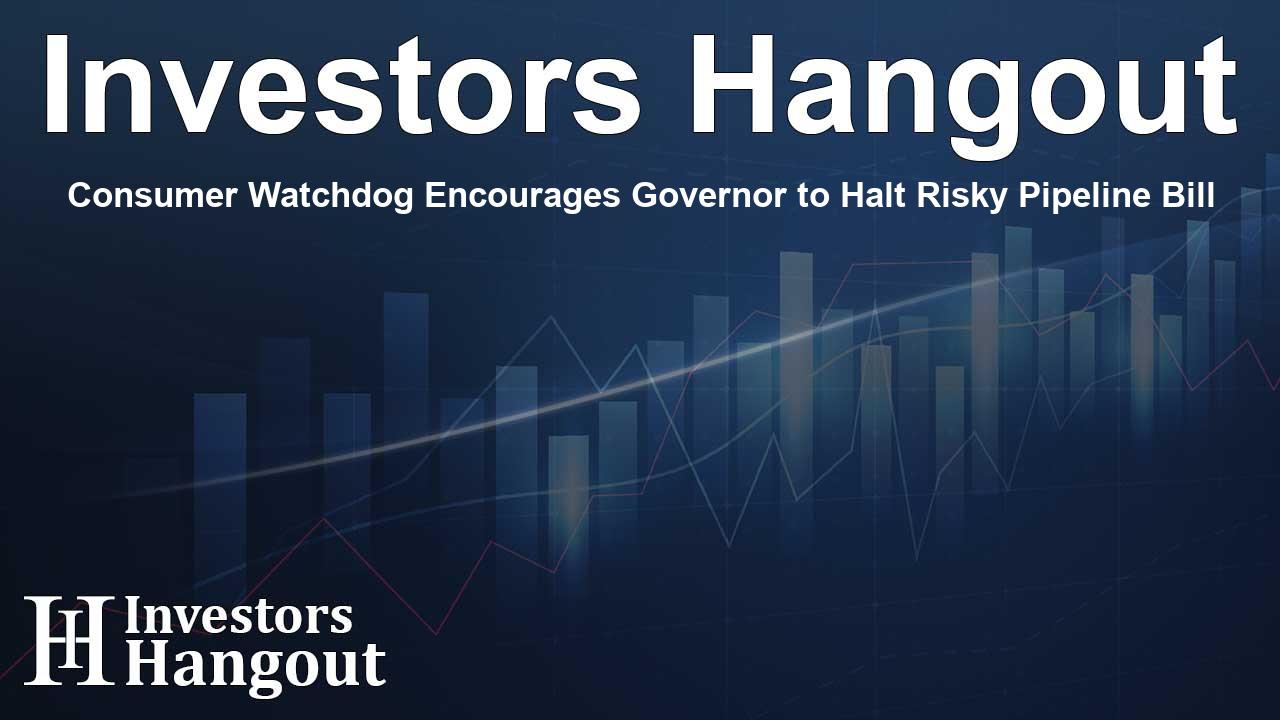Consumer Watchdog Encourages Governor to Halt Risky Pipeline Bill

Consumer Watchdog's Call to Action for the Environment
In a compelling push for environmental safety, Consumer Watchdog is urging the Governor to reconsider the implications of SB 614, a legislation that could pave the way for hazardous carbon dioxide pipelines. These pipelines are proposed as part of carbon capture and storage (CCS) initiatives, an approach that has sparked substantial debate due to its potential risks. Given the growing concerns about climate change, this call for a veto comes at a critical time when effective climate leadership is urgently needed.
Understanding the Risks of SB 614
The organization expresses significant concerns regarding the lifting of a moratorium on the construction of these pipelines under the new legislation. Consumer Watchdog emphasizes that the bill lacks crucial safety measures, particularly a required distance, or setback, between the pipelines and sensitive community areas such as schools and hospitals. This absence of safeguards raises alarms about potential dangers and adverse impacts on public health.
Concerns Over Community Safety
Jamie Court, the President of Consumer Watchdog, communicated these concerns in a letter to the Governor, articulating that the proposed legislation leaves communities at increased risk. Without established safety distances, sensitive receptors may be unprotected from potential leaks or ruptures that could occur should the pipelines operate dangerously.
The Role of Industry Lobbyists
Oil industry representatives, including those from California Resources Corp. (CRC), have contested calls for stricter safety regulations. Their influential positions may complicate efforts to advocate for community protection, risking the health and safety of local populations in favor of corporate interests. These CCS projects are accompanied by promises that often do not materialize, highlighting an unsettling pattern of underperformance and ineffectiveness.
Environmental Accountability and Legislative Responsibility
Consumer Watchdog further critiques the architects of SB 614, pointing out that more robust legislation is essential to protect public health effectively. The letter insists on implementing a mandatory setback distance of at least 3,200 feet from sensitive locations, emphasizing the importance of prioritizing community safety over bureaucratic convenience.
The suggested limit of two miles would provide necessary protection against the inherent dangers of compressed carbon dioxide, which can be especially hazardous when leaks occur.
The Dangers of Carbon Dioxide Pipelines
One of the most significant arguments against the construction of such pipelines is based on the high pressure at which carbon dioxide is transported. This pressure can lead to corrosion, particularly if the gas comes into contact with water, raising the risk of catastrophic bursts. The consequences of a rupture could be dire; carbon dioxide in high concentrations can lead to asphyxiation, making the stakes incredibly high.
Lessons Learned from Past Incidents
The letter references a notable incident from 2020, where a carbon pipeline explosion in Mississippi resulted in serious health repercussions for the nearby community. The failure to add an odorant to the gas during that event exacerbated the danger, ultimately resulting in hospitalizations and evacuations. This situation illustrates the real hazards of carbon dioxide pipelines and underscores the urgent need for stringent safety regulations.
The Road Ahead for Climate Leadership
As discussions around climate change intensify, it is imperative for leaders to reassess policies that may compromise public safety in the name of progress. Consumer Watchdog advocates that true climate leaders must place the well-being of people above the interests of the fossil fuel industry and its controversial carbon capture initiatives. The path forward must prioritize safety and environmental responsibility to ensure a healthier future for all.
Frequently Asked Questions
What is SB 614?
SB 614 is a proposed legislation that aims to lift the moratorium on building pipelines for compressed carbon dioxide, which raises safety concerns.
Why is Consumer Watchdog opposing SB 614?
The organization opposes SB 614 due to the lack of safety setbacks for these pipelines, which could endanger community health and safety.
What are the potential dangers of carbon dioxide pipelines?
Carbon dioxide pipelines pose health risks due to the potential for leaks, ruptures, and the fact that CO2 can be an asphyxiant at high concentrations.
What measures does Consumer Watchdog suggest?
Consumer Watchdog advocates for a mandatory setback distance of at least 3,200 feet from sensitive locations and emphasizes the need for public safety regulations.
How can incidents from the past inform current legislation?
Past incidents, such as the Mississippi pipeline explosion, highlight the real dangers associated with carbon dioxide pipelines and stress the urgent need for safety regulations in current legislation.
About The Author
Contact Addison Perry privately here. Or send an email with ATTN: Addison Perry as the subject to contact@investorshangout.com.
About Investors Hangout
Investors Hangout is a leading online stock forum for financial discussion and learning, offering a wide range of free tools and resources. It draws in traders of all levels, who exchange market knowledge, investigate trading tactics, and keep an eye on industry developments in real time. Featuring financial articles, stock message boards, quotes, charts, company profiles, and live news updates. Through cooperative learning and a wealth of informational resources, it helps users from novices creating their first portfolios to experts honing their techniques. Join Investors Hangout today: https://investorshangout.com/
The content of this article is based on factual, publicly available information and does not represent legal, financial, or investment advice. Investors Hangout does not offer financial advice, and the author is not a licensed financial advisor. Consult a qualified advisor before making any financial or investment decisions based on this article. This article should not be considered advice to purchase, sell, or hold any securities or other investments. If any of the material provided here is inaccurate, please contact us for corrections.
